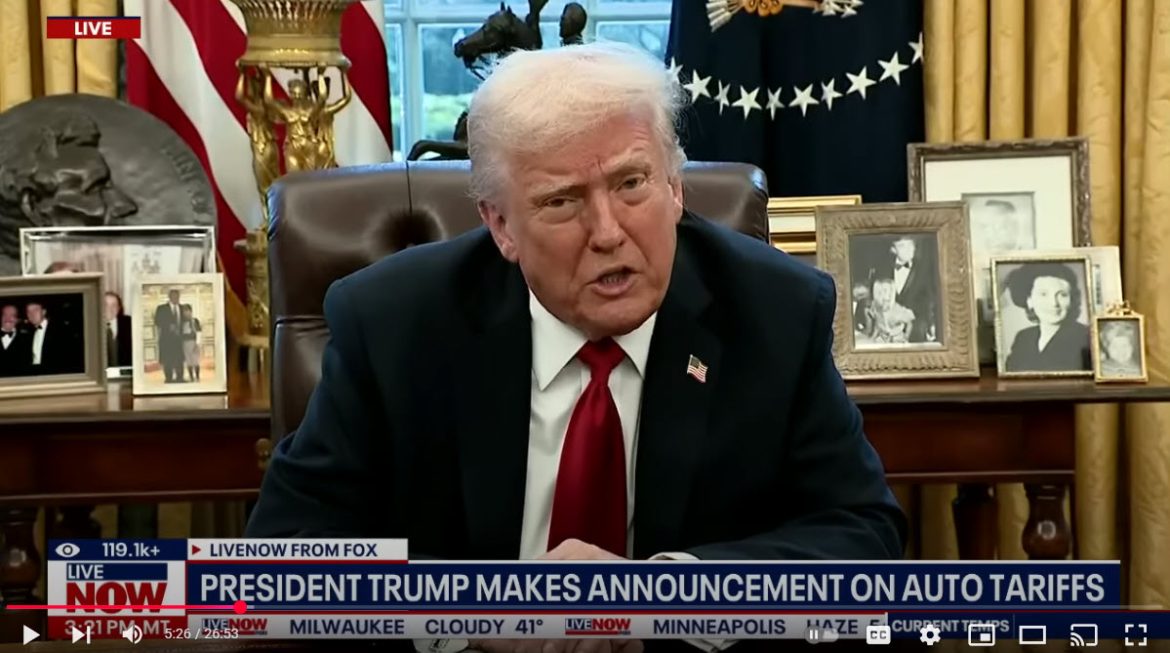President Donald Trump signs a sweeping executive order imposing 25-percent tariffs on all foreign-made cars and trucks entering the United States, triggering swift backlash from key trading partners, particularly Canada. The move marks one of Trump’s most aggressive economic actions since returning to office, and it reignites fears of a global trade war centered around the North American automotive market.
Speaking from the White House, Trump says the measure is designed to “restore American manufacturing dominance” and reduce U.S. dependence on foreign auto production. “For too long, our workers have been sacrificed in the name of bad trade deals,” Trump says. “This is about putting American jobs, American steel, and American assembly lines first.”
The order, effective immediately, imposes a flat 25% tariff on all passenger vehicles, light trucks, and commercial vehicles manufactured outside the United States. Auto parts are also subject to a 10% surcharge. In an added incentive, Trump announces that buyers of U.S.-made vehicles will now be eligible to deduct the full interest paid on auto loans, provided the vehicle is assembled entirely in the United States.
Trump claims the tariffs will bring “between $600 billion and a trillion dollars into the U.S. economy” within the first year and insists the policy will force major automakers to relocate production to American soil. Analysts and economists are deeply skeptical of the projections, warning that such dramatic figures may be overestimated and that American consumers may ultimately bear the cost.
Canadian Prime Minister Mark Carney quickly responds, calling the move “a direct attack on Canada and Canadian workers.” Canada exports more than two million vehicles to the U.S. each year, making the automotive sector one of its most critical economic engines. Carney, who assumed office earlier this year, urges caution and vows to assess the full implications of the policy before launching any countermeasures. “We’re ready to respond appropriately and protect Canadian jobs,” Carney states, adding that he hopes to engage directly with President Trump to de-escalate tensions.
The tariffs are also expected to hit Japan, Germany, South Korea, and Mexico—countries that collectively supply a majority of imported vehicles sold in the U.S. Automakers, including Toyota, BMW, Volkswagen, and Hyundai, have issued statements expressing concern, warning that the new tariffs will likely raise car prices, disrupt supply chains, and cost thousands of jobs at U.S.-based foreign-owned plants.
Labor unions and American steel producers largely support the move, arguing it will revitalize domestic production. However, the United Auto Workers (UAW) union offers a more cautious endorsement, acknowledging the potential for job growth while urging the administration to avoid policies that could lead to inflation or international retaliation.
This isn’t Trump’s first foray into tariff-heavy trade policy. During his first term, he levied tariffs on Chinese goods, steel, aluminum, and various agricultural products—moves that led to retaliatory tariffs and turbulence in international markets. His use of tariffs as both a negotiating tactic and an economic weapon continues to divide political leaders and economists.
As Trump pushes forward with his “America First 2.0” economic plan, experts warn that retaliatory tariffs from trade partners like Canada, the EU, and Japan could impact a wide range of sectors—from agriculture to electronics to energy. The Biden administration previously avoided auto tariffs, preferring cooperative approaches through international trade frameworks like USMCA and the World Trade Organization.
As of now, no formal response has been filed by Canada or other impacted nations, but global economic observers expect countermeasures if negotiations fail. U.S. auto dealers are already bracing for sharp increases in vehicle prices this summer, especially in the used car market, which may see ripple effects due to disrupted imports.
Sources:
https://youtu.be/wh8Jry3hUAA
https://abcnews.go.com
https://reuters.com
https://cnn.com
https://bloomberg.com
https://cbc.ca



